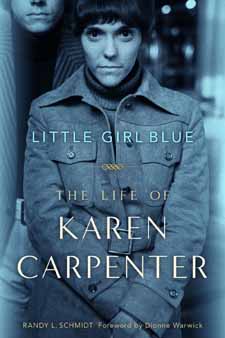I was never a fan of The Carpenters. Yes, like any other kid growing up in the 70s I knew their songs, but I was a punk, and before that, a Sparks, Steve Harley & Cockney Rebel, Be Bop Deluxe, Blue Oyster Cult, Bowie, Mott the Hoople, T. Rex, Kiss, Tubes, Hawkwind, Stooges fan – not a Carpenters fan. But recently I discovered the solo record from Karen Carpenter, and then read Randy Schmidt’s book ‘Little Girl Blue – The Life of Karen Carpenter.’ I love that album, and can’t believe it was never released until 1996, years after her death.
 In 1979, while her brother Richard was side-stepping the limelight to get his act together from pills and stuff, Karen Carpenter recorded her self-titled solo album with Phil Ramone as producer. She tried many different styles of music on the album, including disco. The first half of 1979 was THE time for mainstream acceptance of disco, but July 12th was the moment that disco died, killed by Disco Demolition Night at Chicago’s Comiskey Park, where insecure rock fanatics demanded that their sound come back into favor again. Sadly, the record companies listened, and the tide changed almost overnight, bring rock back into dominance. Even though only a few tracks had that sound, Karen’s solo record became one of many casualties of the ‘disco sucks’ movement, which reminds me of today’s Tea Party movement.
In 1979, while her brother Richard was side-stepping the limelight to get his act together from pills and stuff, Karen Carpenter recorded her self-titled solo album with Phil Ramone as producer. She tried many different styles of music on the album, including disco. The first half of 1979 was THE time for mainstream acceptance of disco, but July 12th was the moment that disco died, killed by Disco Demolition Night at Chicago’s Comiskey Park, where insecure rock fanatics demanded that their sound come back into favor again. Sadly, the record companies listened, and the tide changed almost overnight, bring rock back into dominance. Even though only a few tracks had that sound, Karen’s solo record became one of many casualties of the ‘disco sucks’ movement, which reminds me of today’s Tea Party movement.
 Until Randy Schmidt’s book, Karen’s story had been somewhat marginilized. Saying “Karen starved herself to death and died from anorexia” over-simplifies as much as saying “Danny Boyle’s 127 Hours is about the hiker that cut his own arm off when he got trapped.” Though both statements are true, the complexity of both situations were infinitely greater.
Until Randy Schmidt’s book, Karen’s story had been somewhat marginilized. Saying “Karen starved herself to death and died from anorexia” over-simplifies as much as saying “Danny Boyle’s 127 Hours is about the hiker that cut his own arm off when he got trapped.” Though both statements are true, the complexity of both situations were infinitely greater.
If you want to know what complexities contributed to Karen’s situation, read Little Girl Blue. It is a worthy read. For instance, even of you knew that Karen was a drummer and drummed in The Carpenters, who could imagine that Hot Rod drum king Hal Blaine drummed for them in the studio, and said about her “We had an instant professional love affair because she knew everything I’d done” (see page 58 of Little Girl Blue).
Let’s talk about the CD. The record starts off with Lovelines, which is 5 minutes of bliss. It has a disco-ish feel, but ultimately has a ‘Karen’ feel – she makes the sound all her own. Two other tracks on the CD that have the same basic sound are My Body Keeps Changing My mind and Guess I Just Lost My Head
The album has lots of somewhat melancholy tracks, such as If We Try, Make Believe It’s Your First Time, and especially the last two tracks, the cover of Paul Simon’s Still Crazy After All These Years, and the closer, Last One Singing The Blues, which (though entirely different sounding than) reminds me of Donna Summer’s Last Dance.
In between the two extremes (the upbeat disco-ish tracks and the melancholy ones) are tracks in several different genres, all interesting, and all unprecedented in her back catalog till this point. Still In Love With You is a rock track with a Southern feel. All Because of You is a ballad carried by her incredible not-perfect-but-all-the-more-perfect-for-that-fact voice, which cracks like a whisky soaked angel. If I Had You and Remember When Lovin’ Took All Night sound the most like Carpenters tracks to my ears, with Queen-like thick multi-tracked background vocals.
Many hipsters have championed Karen Carpenter is years past. The person I think of most is Kim Gordon, who wrote Tunic (Song for Karen) on Sonic Youth’s 1990 album Goo. In 1994, Karen’s label (Herp Alpert’s A&M Records) released the If I Were a Carpenter compilation, though no one covered anything from her solo record (Sonic Youth covered Superstar, a song originally performed by Bette Midler). This is not too surprising, as the solo record was not released till 1996, though I imagine that fans had found grey area pressings of it for years before that.
